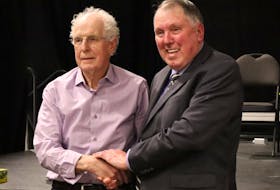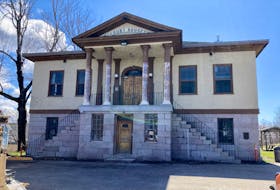TRURO, N.S. — Duelling with German fighter planes and sucking air through a mask four miles high was Roy Morrison’s experience of war.
More than 70 years later, Morrison joined dozens of others to mark the 79th anniversary of the Battle of Britain in Truro on Sept. 15. He laid a wreath to honour the hundreds of aircrew who lost their lives fighting Hitler’s Luftwaffe.
“I have great respect for all those young fellows that didn’t make it and great respect for the ones that did,” said Morrison, now 96 and living in Truro Heights. “They were only 18 and 19 years old and I know what it’s like to go over and through that misery.”
Sept. 15, 1940, was the day of massive aerial battles between British and German planes over southern England. The result was an Allied victory that prevented a German invasion.
Morrison himself was too young to fight in the Battle of Britain, but he was shipped out to England in 1943. He joined the Royal Air Force and trained as a tail gunner on the Lancaster bomber.
As Morrison soon learned, it was a dangerous job. Flying bombing missions over Germany of up to six hours long, the Lancasters were often swarmed by Luftwaffe planes.
“They were shooting at you all the time,” recalled Morrison. “We were just waiting to get hit – and we often did… People were blown to bits around us and [we’d] see them falling down to Earth in parachutes, wondering if they were going to see Canada or any part of the land again.”
Even when there were no German fighters, Morrison found the sky a dangerous place. Bombers flew at altitudes of up to 23,000 feet and he said temperatures at cruising height were “40 below.”
Morrison and his crew members wore electrically-heated suits to stay warm, as well as breathing through oxygen masks. Lancaster crew cabins were not pressurized.
He flew a total of 30 missions over Germany and occupied Europe until early 1945, after which he returned to Canada.
But Morrison never knew exactly when the next mission over Germany could come.
“They might call you in the middle of the night,” he said.
Back on the ground, he was stationed in a village called Tuddenham, located in the county of Suffolk. This part of eastern England was home to many bomber bases.
Accommodation was basic, as men lived in barracks huts. Aircrews could visit pubs and party in the evenings.
However, the war was never far away, even after the Allies won the Battle of Britain. The Germans would fire V-1 and V-2 missiles at London and other cities – and Morrison saw the results.
“You could hear it coming, it was a rattly old thing and when the motor cut out, it would just drop to the ground and blow you up,” said Morrison of the V-1s. “Oftentimes when I was in London, bombs were falling all around us.”
By war’s end, Morrison reached the rank of Warrant officer. He says the Second World War taught him the importance of living just one day at a time.
He also wished today’s youth lives of peace.
“I hope they never have to go through it,” said Morrison.








